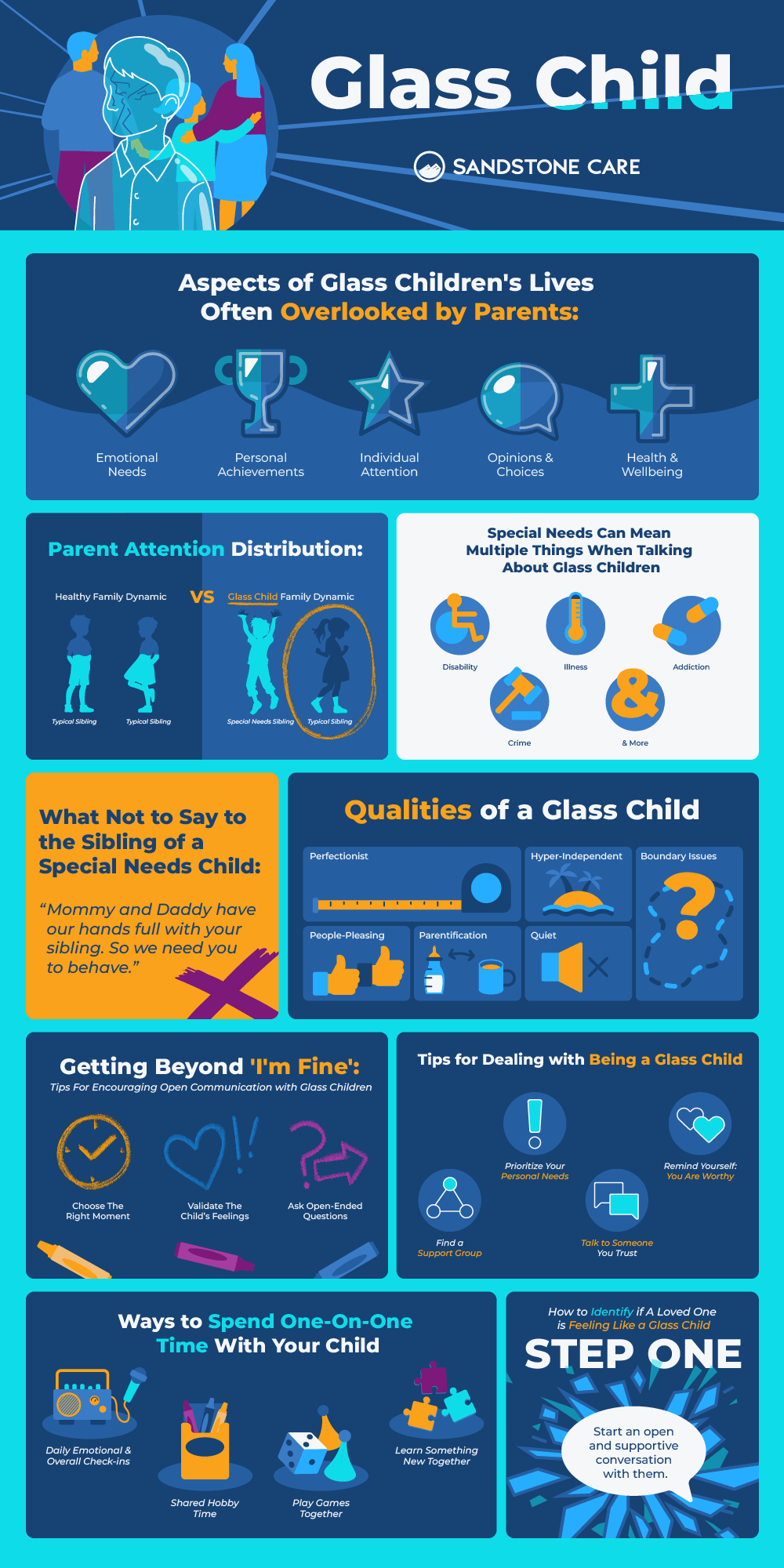Glass Children
What is a Glass Child?
A “glass child” is a term used to describe a child who is often overlooked or neglected due to the focus on their sibling with special needs or chronic illness. It doesn’t refer to the child being fragile, but rather to the parents seemingly “looking right through” them due to the demands of caring for their other child.
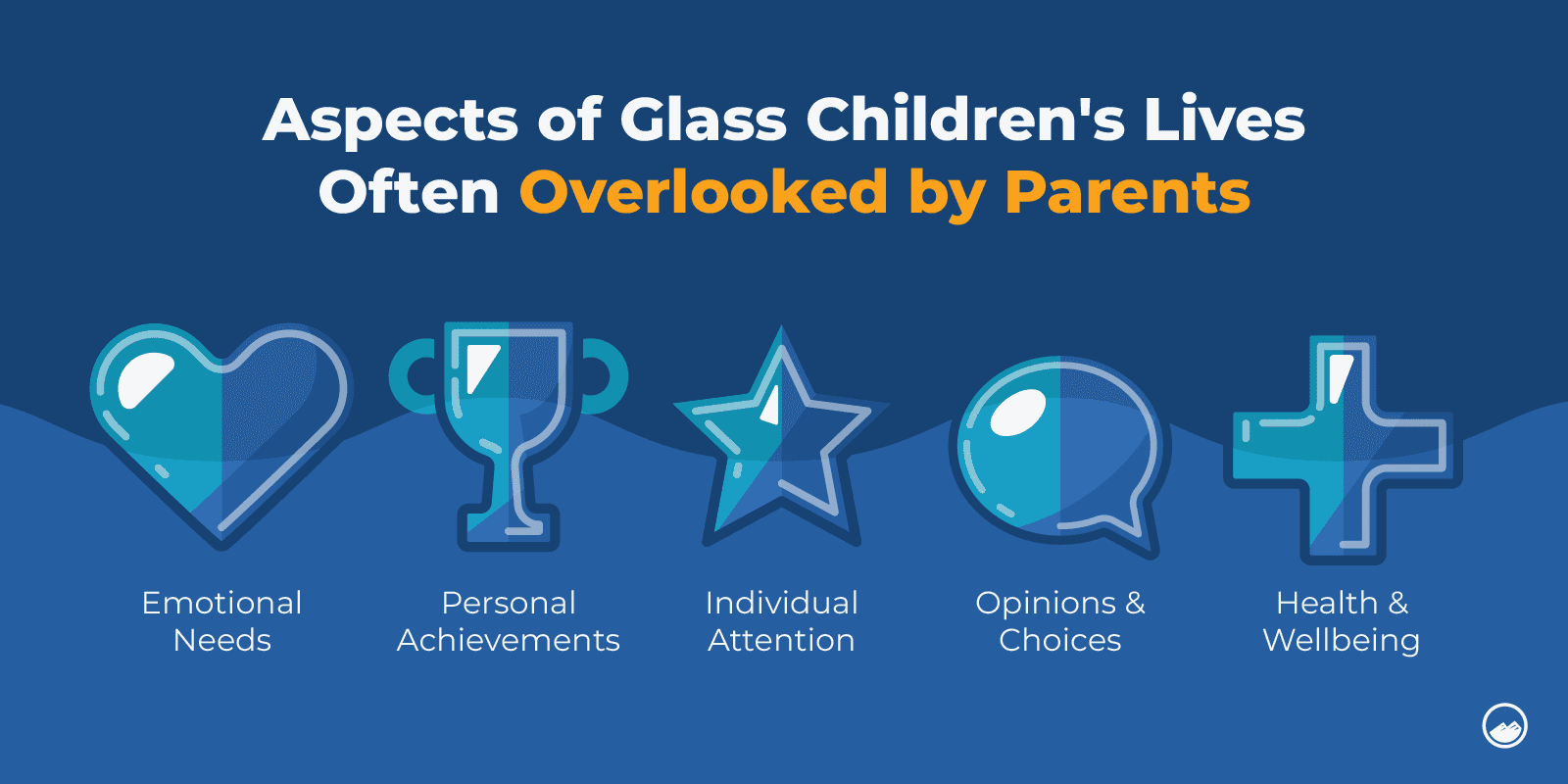
The term “glass child” or “glass children” is still relatively new. While the origin of the term has been lost, it was popularized again through a TED Talk hosted by Alicia Maples.
What Does Being A Glass Child Mean?
A glass child describes a sibling of a child with special needs or who needs constant additional support or attention.
In families where one child has significant needs due to a disability, illness, or other challenges, their siblings can sometimes feel like “glass children.” It’s not that these siblings are fragile, but rather that their needs and emotions can be overlooked or minimized in comparison to those of their sibling.
Glass children often act as the antithesis to fragility – being expected to be fine, independent, problem-free, and ready to support parents or forgive siblings who may act out or otherwise disrupt the home atmosphere.
What Causes a Glass Child?
A glass child can result from a combination of factors. Factors may include having at least one sibling with special needs; this could be combined with a lack of attention from their parents.
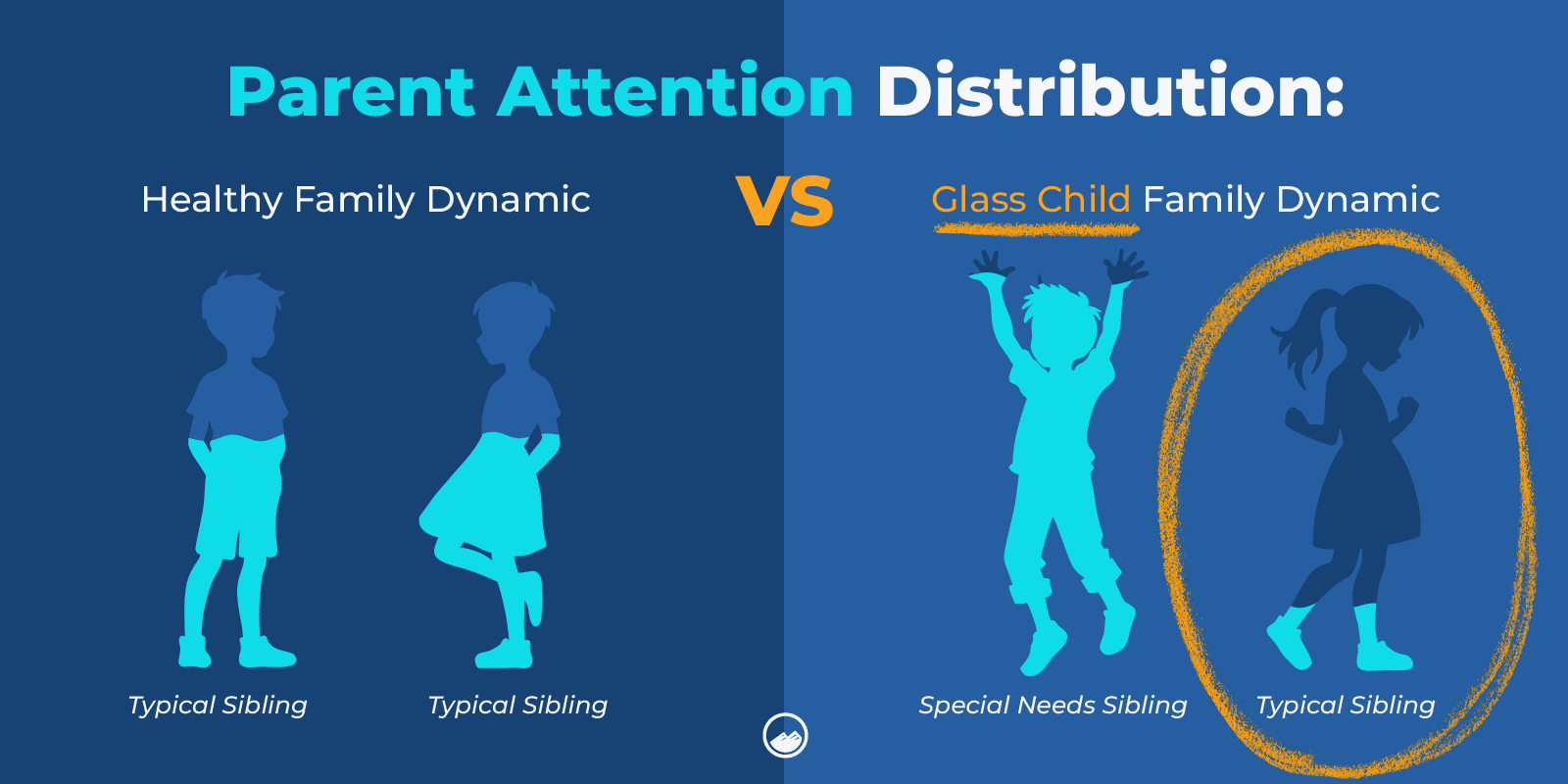
Typically, this attention is diverted toward this special needs sibling.
However, the kind of “special need” can vary from situation to situation. Some of the special needs in siblings that can cause a glass child can include:
- Autism
- Mental health disorders or mental illness
- Developmental disabilities
- Physical disabilities
- Chronic illness
- ADHD
- Addiction, including alcohol use, drug use, gambling, and more
- Criminal activity
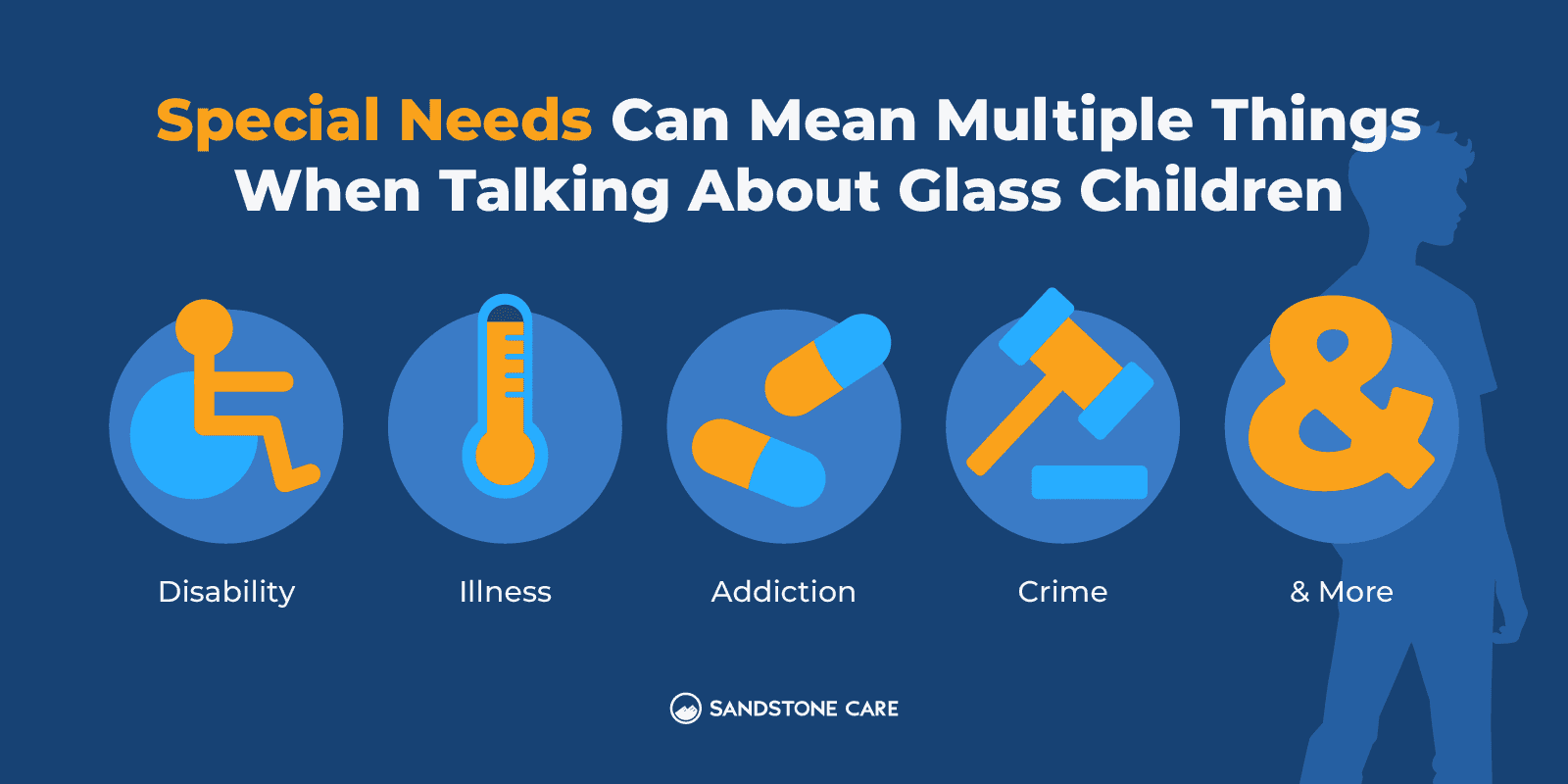
Having a disabled sibling or sibling with additional needs can change family dynamics dramatically. As “healthy children,” these glass children can be expected to not just tend to their own needs without additional support, but must also learn to cope with the trying situation of having a special needs sibling by themselves.
This can lead to children dealing with the situation without support from their parents, leaving them to find ways to cope alone.
Who Is the Glass Child?
The glass child describes the healthy sibling in a family with a disabled child or child with special needs.
Glass children are expected to “be healthy” and “be fine” and do what is expected without acting out, all while parental support is siphoned to the special needs child. This leaves these children feeling neglected and alone.
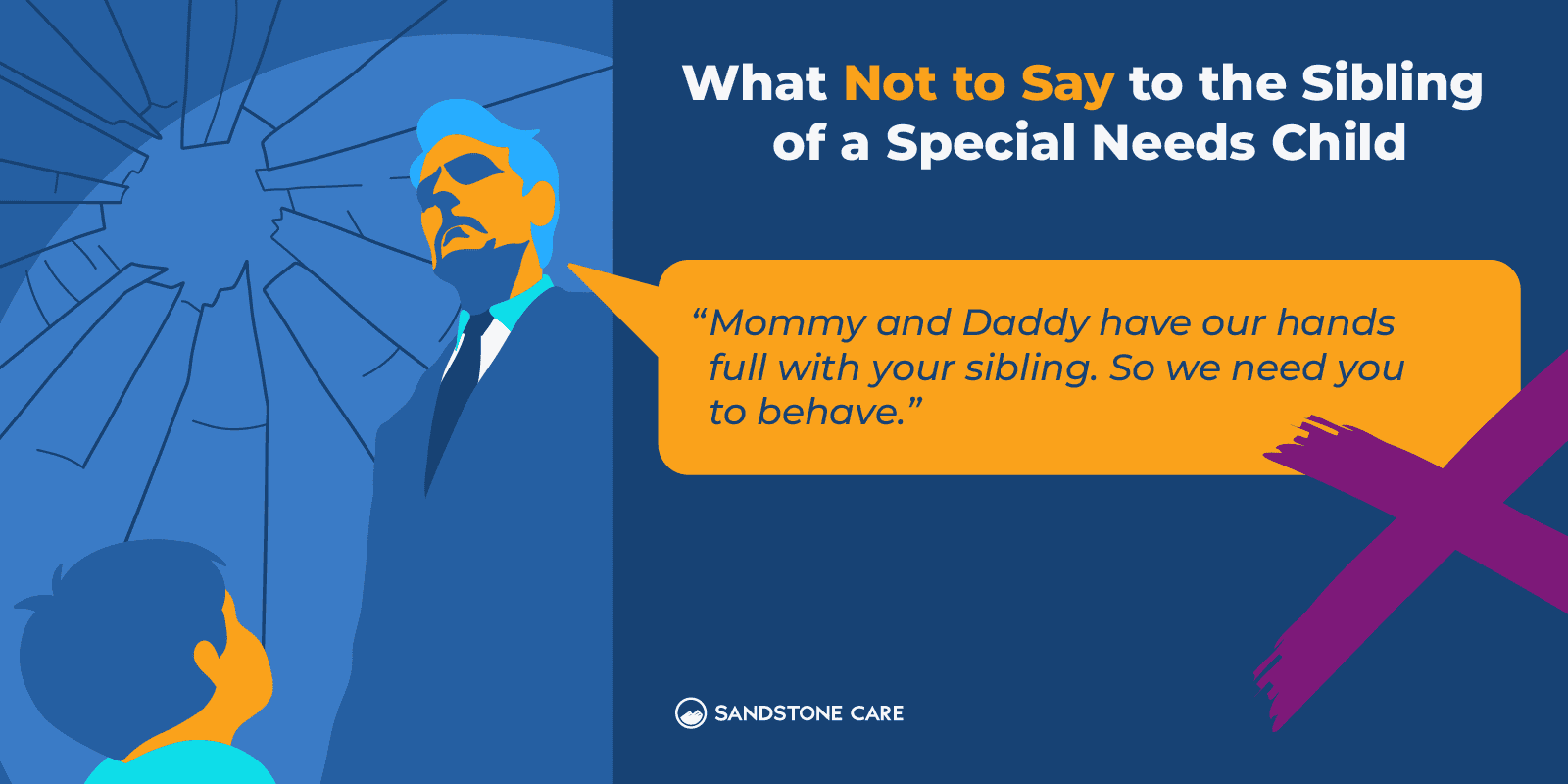
What Are the Characteristics Of a Glass Child?
A glass child can have their childhood profoundly affected. These experiences can shape who they are as children and how glass children develop into adults.
A glass child may adopt many behaviors or mentalities to accomplish their role of appearing “fine” on the surface. This includes:
- Being chronic people pleasers
- Inability or unwillingness to address or express personal needs
- Always saying everything is “fine,” regardless of how they actually feel
- Compromised sense of self-worth, or feeling defined by their special needs sibling
- Feeling isolated
- Development of trauma or post-traumatic stress disorder (PTSD)
- Being forced to “grow up” rather than experience childhood
Each of these can begin to manifest at a young age, with younger siblings often adopting the role of a caregiver to their special needs family members, even while still a child themselves. Likewise, some glass children may even be expected to do whatever it takes to make their parents happy, even at the expense of their own needs, wants, or well-being.
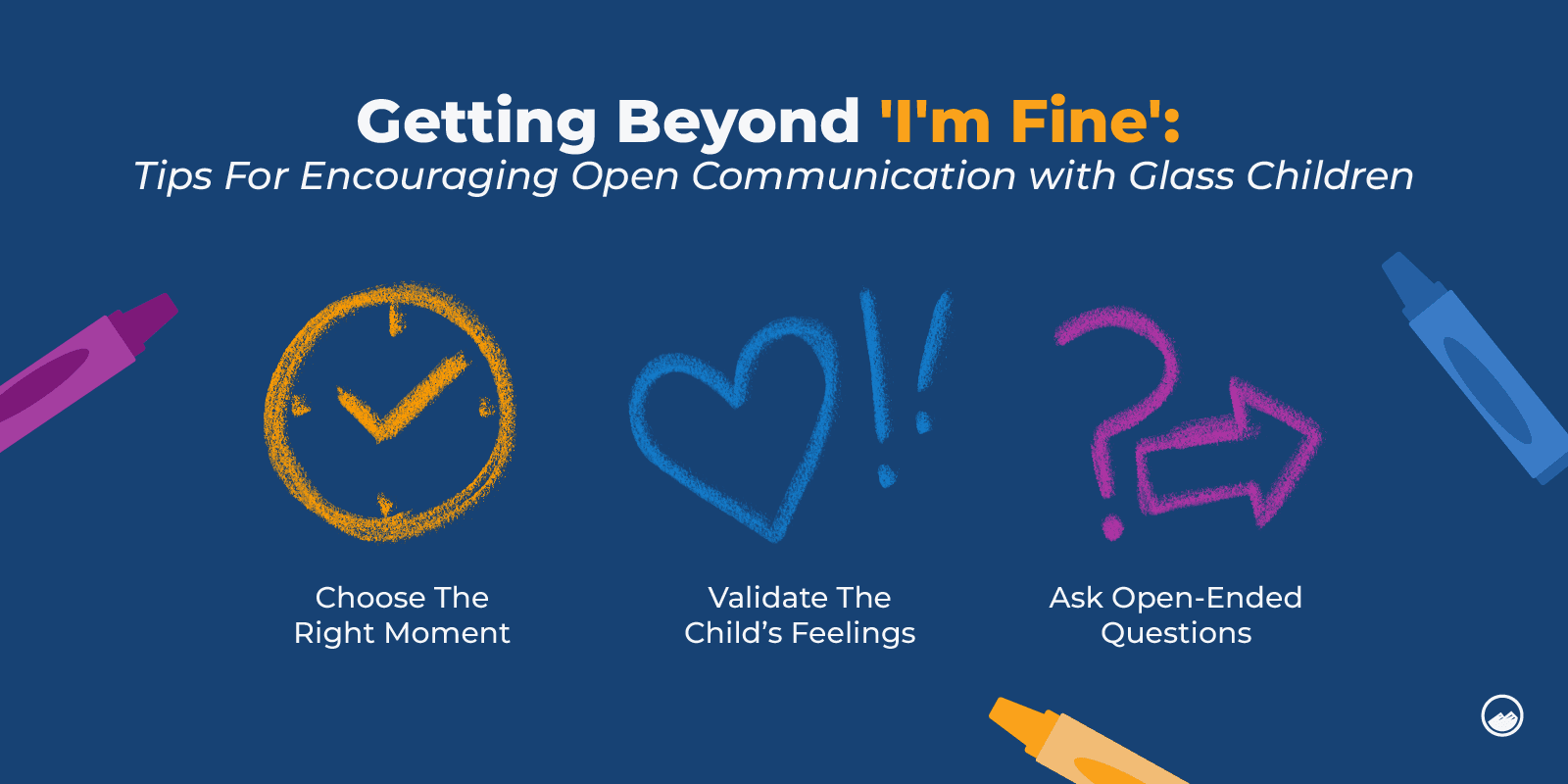
Glass Child Syndrome
What Is Well Sibling Syndrome?
Well sibling syndrome describes a child with a sibling with developmental challenges, cognitive delays, or mental health disorders that leads to a “healthy child” feeling overlooked or ignored as parental attention is given to a special needs sibling.
In addition, glass child syndrome extends the definition of well-sibling syndrome to include many more challenges that can have similar effects on a healthy child. This includes any kind of situation where more attention is given to a sibling, such as with chronic illness, addiction, criminal engagement, and more.
What Are Glass Child Syndrome Symptoms?
By definition, glass children can be difficult to identify, often being overlooked next to their special needs siblings.
However, glass child syndrome does have several symptoms that can be identified if a person knows where to look. Some of these signs include:
- Perfectionism, or pressure to be “problem-free”
- Children taking parental or caregiver roles from a young age
- Are people pleasers, or feel compelled to make others happy, even at the expense of their well-being or without having such support themselves
- Children are quiet or have difficulty or an unwillingness to express personal wants or needs
- Difficulty setting boundaries
- Hyper-independence
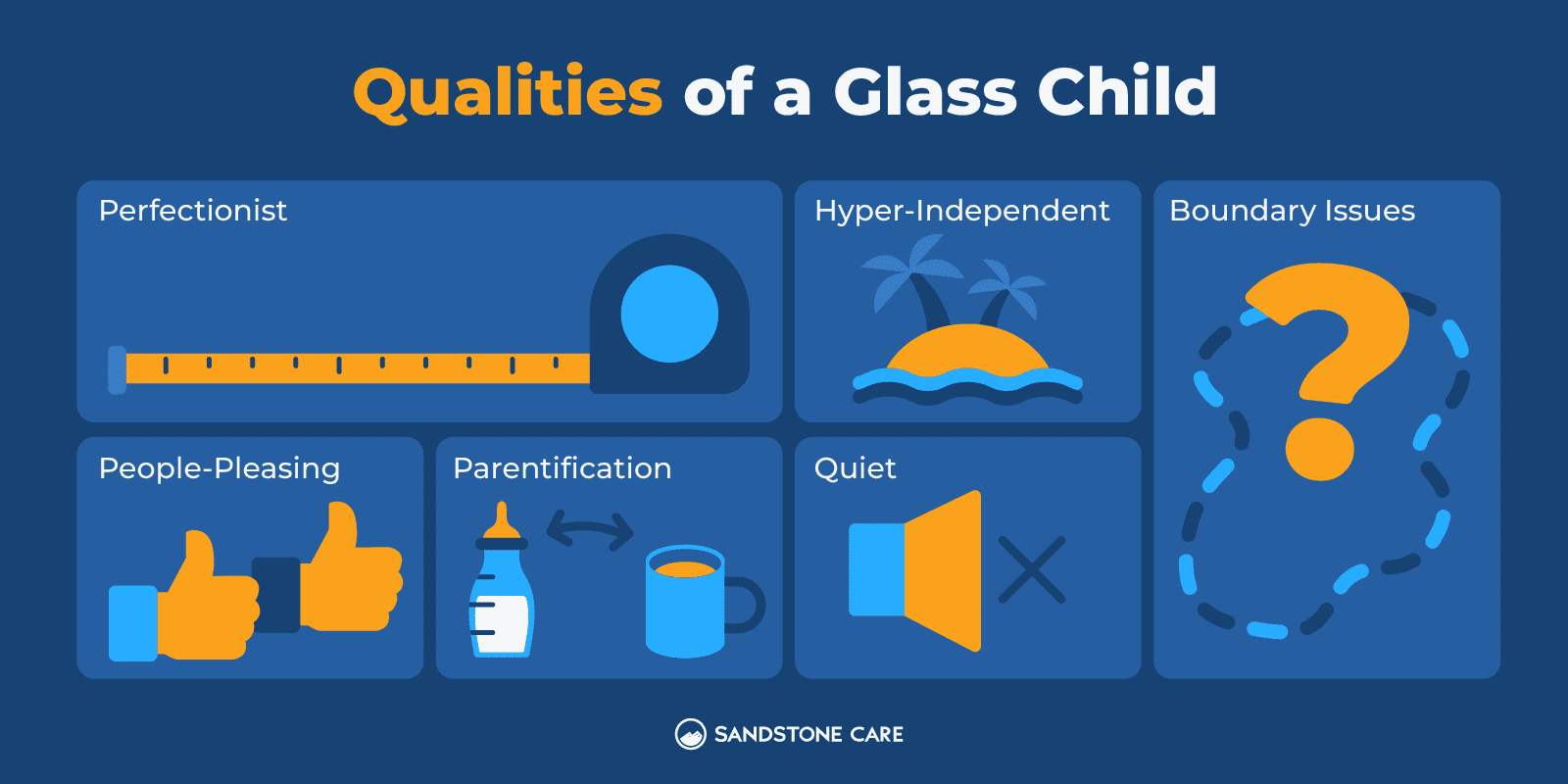
What Is the Glass Child Syndrome For Parents?
Parents play a large role in the development of, and healing from, glass child syndrome.
For parents, a glass child occurs when parental attention is not divided between children equally, and the needs of a special needs child overshadow the needs of a “healthy child.” This can come in a lack of one-on-one time with “healthy children.”
Parents may also expect or ask a healthy child to tend to their own needs while parents cope with the needs of a special needs child. However, having a special needs child affects an entire household. Glass children are often left to tend to their own needs alone, as well as cope with the stress of a special needs households.
Glass Siblings
How Does Having a Disabled Sibling Affect You?
Having a disabled sibling can have a myriad of effects on an individual.
Unfair expectations can increase feelings of resentment, depression, and more. Having a disabled sibling as a part of the family can be trying for entire households, not just parents.
A “healthy child” may also experience a compromised sense of self-worth or cause an individual to believe they have to be “perfect” in an attempt to not add further turmoil into the home atmosphere.

However, having a sibling with special needs can also affect children in other ways. It can be difficult to have friends over to play, leading some children to feel isolated or have difficulty developing relationships. Likewise, some children may compromise their own goals or interests to support more around the house despite being a child.
Is Having a Disabled Sibling Traumatic?
Having a sibling with special needs can be a traumatic event and can lead to further trauma or post-traumatic stress disorder as an adult.
Each situation will be unique. However, the additional needs and challenges that special needs children present, or even special needs adult siblings, can continue to impact entire families.
Likewise, for a sibling of a brother or sister with special needs, these traumas can take many forms. For some, a stressful and tense home atmosphere can make the area feel unsafe or uncomfortable, while others may suffer from emotional neglect.
What Is the Parentification of Disabled Siblings?
Parentification refers to the act of taking on parental or caretaker roles from a young age. A healthy child in a family with a disabled or special needs sibling can be asked to take on many of these roles.
Often, glass children essentially become another parent to their brother or sister at the cost of their own childhood.
Glass Child Syndrome in Adults
An individual does not necessarily “grow out” of being a glass child, and being a glass child has many lasting implications in adulthood.
What Happens to Glass Children as Adults?
Glass children will often develop unhealthy coping strategies or beliefs as they transition into adulthood, each of which is informed by being a glass child throughout their youth.
The pervasive stresses can cause some to look to self-destructive coping strategies like substance use, while others may continue to harbor self-belittling beliefs or a compromised sense of self-worth.
What Are the Long-Term Effects of Glass Children?
Being a glass child has many lasting effects on a person that must be addressed. Finding professional treatment, support groups, and more is necessary for many coping with the long-term effects of being a glass child.
First, there can be a myriad of mental health disorders that can manifest as a result of stress, emotional neglect, or feelings of isolation. Some of these long-term effects include:
- Low self-esteem
- Anxiety
- Depression
- Trauma or PTSD
- Difficulty making or maintaining relationships
- Perfectionism
- Feeling validated only by the external value of others
- Addiction
- Difficulty expressing or tending to personal needs
- Being compulsive people pleasers
Some glass children may have even more challenges in adulthood, even experiencing intense depression and self-loathing to suicidal ideation.
Finding effective treatment, support groups, and communities to feel understood and validated is necessary for an effective approach to healing from the long-term effects of being a glass child as an adult.
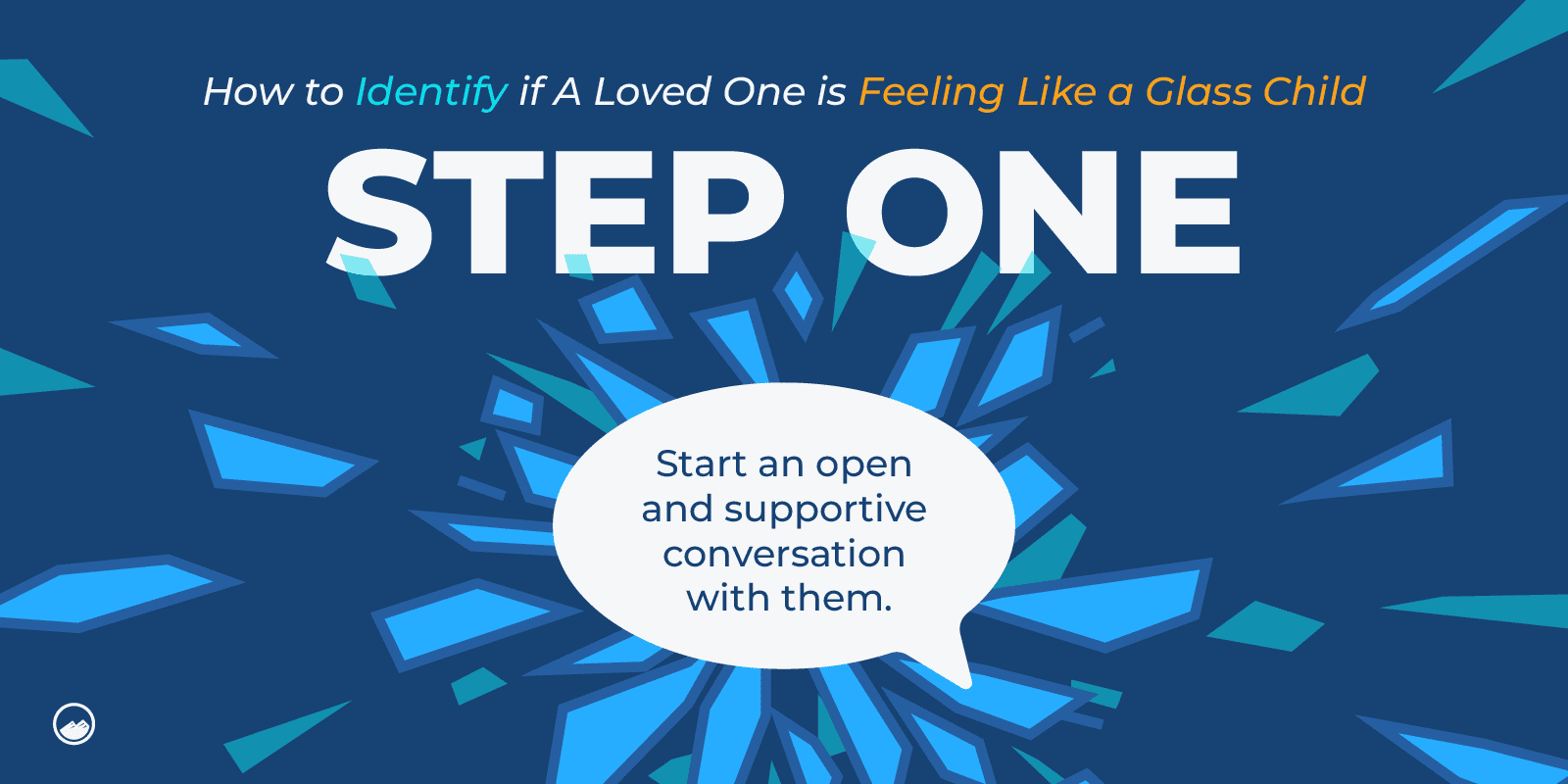
How to Heal From Being a Glass Child
It can be difficult to heal from being a glass child, with many long-term and deeply ingrained beliefs, behaviors, and more all continuing to impact daily life.
However, healing is always possible with the right approach, support, and community.
For some, dedicated treatment programs to cope with the trauma of being a glass child are necessary. Others may benefit from addressing these traumas alongside Sandstone Care’s effective addiction recovery treatment programs for a comprehensive approach to healing.
How Do You Deal With Being a Glass Child?
Dealing with being a glass child is exceptionally difficult, especially since many glass children may have already adopted a mentality that compromises their own needs.
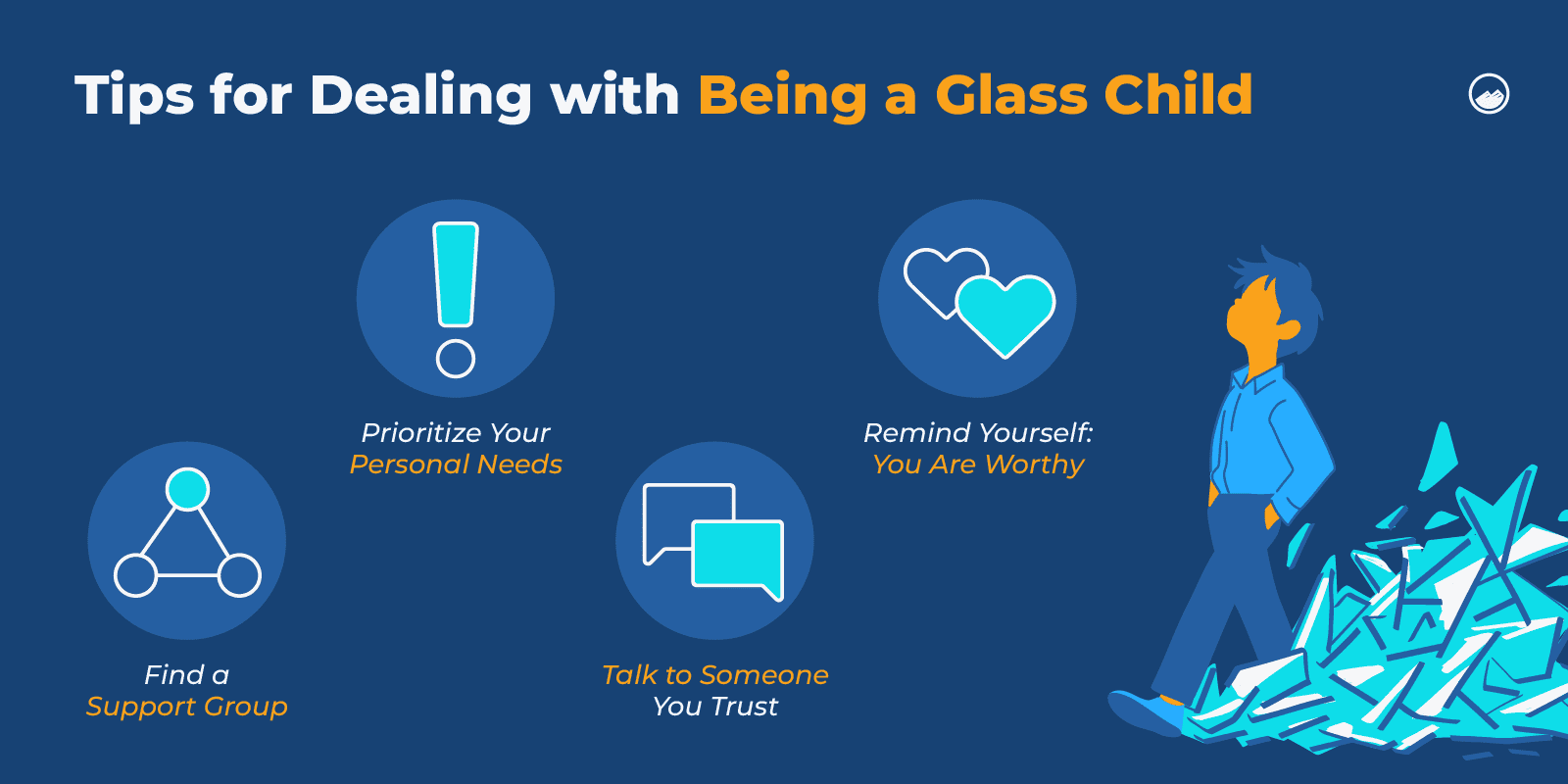
Finding a support group, prioritizing personal needs, feeling validated by others unconditionally rather than valued due to a service they can provide, and more are all great ways to start.
Reminding oneself that the situation is not normal can also help contextualize each person’s experiences. Knowing their situation is unique can help limit comparisons to others and drive home the need to take additional care to tend to personal needs and goals and find validation.
How Do You Heal From Being the Glass Child?
Finding treatment programs and support groups as an adult can help to address the challenges of being a glass child.
For some, these can be local, in-person support groups that can help deal with the lasting traumatic effects of being a glass child. However, other young people may find online communities that can validate these feelings and challenges. Finding a community can help glass children to learn how to address the situation and adopt the mentalities or language that they need.
Connecting with others and engaging in professional treatment programs and healing communities cannot just challenge self-destructive beliefs or practices but also help to develop new coping skills as an adult.
Maintaining boundaries, exploring personal needs and self-care, challenging perfectionist mentalities, and more are all part of a complicated but possible healing journey.
How Do You Prevent Glass Child Syndrome?
Parents play an integral role in preventing the development of glass child syndrome.
For parents, it is important to remember that just because one child has special needs does not mean that another child’s needs are not just as important, only that these needs differ from child to child.
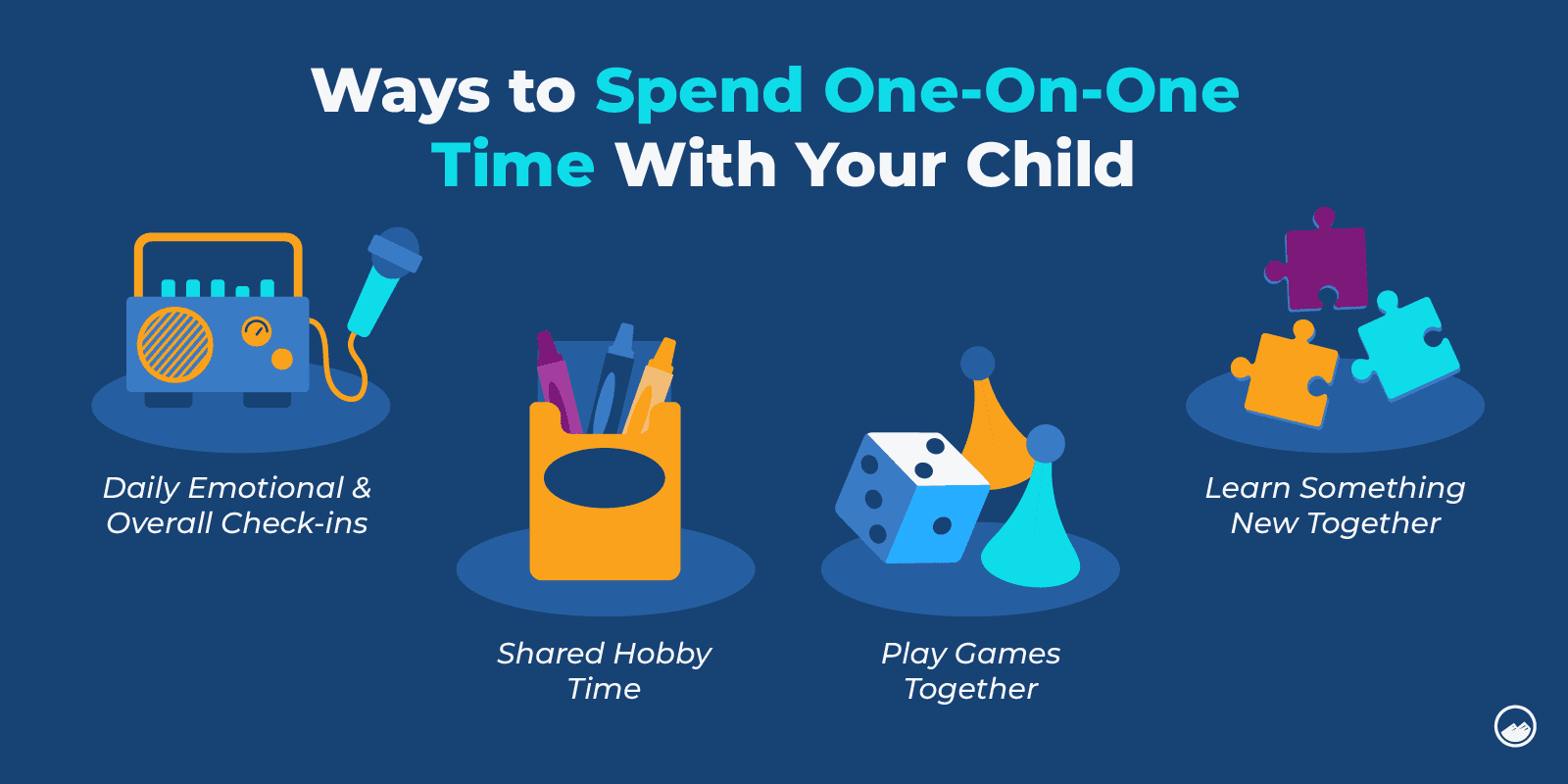
Making an effort to provide one-on-one time each day to make sure a child feels emotionally heard and validated, exploring social outlets for children, limiting the parentification of “healthy” children, and celebrating each child’s accomplishments are paramount.
It can be difficult to have the energy and resilience to be a parent to multiple children, especially when there is a child with special needs. However, it is possible. Relying on local support groups or extended family can be the beginning of exploring new resources, either in support of a special needs child or to tend to the needs, interests, and goals of a “healthy child.”
FAQ
You Have Questions, We Have Answers.
Our goal is to provide the most helpful information. Please reach out to us if you have any additional questions. We are here to help in any way we can.
Being a glass child is difficult.
If you feel overlooked, neglected, or as if your needs are not treated as equal to the needs of a special needs sibling, talking with professionals about the situation can help to identify glass child syndrome and make adjustments to prevent the long-term effects of being a glass child.
Anxiety is one of the most common symptoms of glass children and can be difficult for many glass children to address and overcome as it develops.
Knowing if your sibling is a glass child can be difficult because they may avoid conversations that they feel “burden” the rest of the family.
Make an effort to validate their feelings, asking how much time your parents spend with them, or expressing interest in their hobbies. These can all be ways to begin to explore this complicated, difficult question, especially if a sibling feels hesitant about opening up.


Let’s Take the Next Steps Together
Healing from glass child syndrome is difficult and often involves overcoming unhealthy beliefs and practices and addressing trauma, substance use, and much more. Sandstone Care is committed to this kind of holistic approach to treatment, addressing the use of drugs or alcohol alongside the sources of trauma for a comprehensive and proven approach to healing. For more information on how we can help you begin your healing journey, call to speak to a caring, trained staff member today






